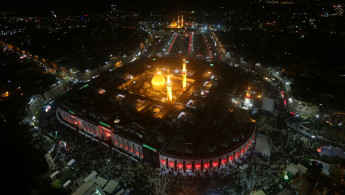Millions in Karbala to mark seventh century Ashura battle
Millions of Shia Muslim pilgrims embarked on the Iraqi shrine city of Karbala on Wednesday, weeping and beating their chests in mourning for the seventh century killing of the Prophet Mohammed's grandson.
The annual Ashura commemorations - which peak on the tenth day of the Islamic month of Muharram on Wednesday - mark the killing of Hussein ibn Ali by the army of the ruler of the time, Yazid.
The event is highly revered by Shia Muslims who flock to Karbala every year - where Hussein was buried following the brutal battle in 680AD.
The pilgrimage draws huge numbers of faithful, with Karbala deputy governor Ali al-Mayali saying three million were expected to take part this year.
According to narrations, Hussein was embarking on a journey towards Kufa after being urged by its people to rescue them from the tyrannical leader when his convoy of men, women and children was stopped by the forces in Karbala.
After days of battling the opposing army of 30,000 men, Hussein was decapitated, his supporters were killed and the remaining women and children were captured as prisoners and paraded among the people.
Hussein's ideal of self-sacrifice is a key tenet of Shia Islam to this day, inspiring followers to give their lives for causes, including the war against the Islamic State group.
Shias in Iraq have come under frequent attack by extremists of the Islamic State group who regard them as heretics.
With this in mind, some 30,000 security personnel were out on the streets to guard the pilgrims, although attacks in Karbala are rare.
Iraqi forces are currently preparing for a final push on Mosul, the last city in Iraq held by IS, which has lost much of the ground it seized in 2014.





 Follow the Middle East's top stories in English at The New Arab on Google News
Follow the Middle East's top stories in English at The New Arab on Google News


